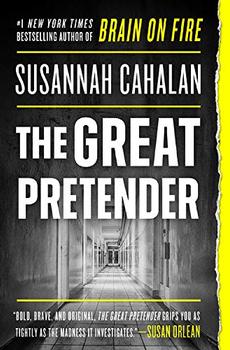Summary | Excerpt | Reading Guide | Reviews | Beyond the Book | Readalikes | Genres & Themes | Author Bio
The Undercover Mission That Changed Our Understanding of Madness

Critics' Opinion:
Readers' Opinion:
First Published:
Nov 2019, 400 pages
Paperback:
Jul 2020, 400 pages
 Book Reviewed by:
Book Reviewed by:
Elisabeth Herschbach
Buy This Book
Even if you are one of the lucky few who have never questioned the firing of their synapses, this limitation touches you, too. It shapes how you label your suffering, how you square your eccentricities against the group, how you understand your very self. Psychiatrists, after all, were first known as alienists—a choice term that conveys a sense not only of the doctors' outsider status from the rest of medicine and patients' alienation from themselves, but also of being the other. "Insanity haunts the human imagination. It fascinates and frightens all at once. Few are immune to its terrors," wrote sociologist Andrew Scull in his book Madness in Civilization. "It challenges our sense of the very limits of what it is to be human." It's undeniable: There is something profoundly upsetting about a person who does not share our reality, even though science shows us that the mental maps we each create of our own worlds are wholly unique. Our brains interpret our surroundings in highly specific ways—your blue may not be my blue. Yet what we fear is the unpredictability of a mentally ill "other." This fear emerges from the sneaking realization that, no matter how sane, healthy, or normal we may believe we are, our reality could be distorted, too.
Before I turned twenty- four, all I'd really known of madness was from reading a stolen copy of Go Ask Alice in elementary school, or hearing about my stepfather's brother who was diagnosed with schizophrenia, or averting my eyes as I passed a homeless person pawing at imaginary enemies. The closest I got to looking it in the eyes was when, as a tabloid reporter, I'd interviewed in prison a notorious sociopath, whose sharp wit made for great copy. Mental illness was cinematic: the genius mathematician John Nash, played by Russell Crowe in A Beautiful Mind, drawing equations on chalkboards, or a sexy borderline à la Angelina Jolie in Girl, Interrupted. It seemed almost aspirational, some kind of tortured but sophisticated private club.
And then my illness struck, the autoimmune encephalitis that would devastate me, briefly robbing me of my sanity and changing my life. Sharp fragments of that time stay with me a decade later, slivers from my own memories, my family's stories, or my medical records: the early depression and flu-like symptoms, the psychosis, the inability to walk or talk, the spinal taps, the brain surgery. I remember vividly the imaginary bedbugs, which I believed had taken my apartment hostage; falling apart in the New York Post newsroom; nearly jumping out the window of my father's third-floor apartment; the nurses I was convinced were really undercover reporters come to spy on me; the floating eyes that terrified me in the bathroom; the belief that I could age people with my mind. I remember, too, the smug, dispassionate psychiatrist who had treated me in the hospital, calling me an "interesting case" and dosing me with what we would later learn were unnecessary amounts of antipsychotic medications. This was around the time that the medical team began to give up on my case, and the words TRANSFER TO PSYCH started to creep into my medical records.
My family, like many families before them, fought against the tyranny of the mental illness label. My parents were resolute: I was acting crazy, sure, but I was not crazy. There was a difference. I may have seemed violent, paranoid, and delusional, but I was sick. It wasn't me. Something had descended upon me in the same way that the flu or cancer or bad luck does. But when the doctors couldn't immediately find a physical cause, nothing concrete to pinpoint and treat like an infection or tumor, their lens shifted. They moved to a possible diagnosis of bipolar disorder, and then to schizoaffective disorder as my psychosis intensified. Given my symptoms, the psychiatrists' diagnoses made sense. I was hallucinating; I was psychotic; I experienced a cognitive decline. No other tests could explain the sudden change. They saw a bipolar patient. They saw a schizoaffective person. They were wrong. But in nearly any other case, they would have been "right."
Excerpted from The Great Pretender: The Undercover Mission That Changed Our Understanding of Madness. Copyright © 2019 by Susannah Cahalan, LLC. Reprinted with permission of Grand Central Publishing. All rights reserved.





The House on Biscayne Bay
by Chanel Cleeton
As death stalks a gothic mansion in Miami, the lives of two women intertwine as the past and present collide.

The Flower Sisters
by Michelle Collins Anderson
From the new Fannie Flagg of the Ozarks, a richly-woven story of family, forgiveness, and reinvention.

The Funeral Cryer by Wenyan Lu
Debut novelist Wenyan Lu brings us this witty yet profound story about one woman's midlife reawakening in contemporary rural China.
Your guide toexceptional books
BookBrowse seeks out and recommends the best in contemporary fiction and nonfiction—books that not only engage and entertain but also deepen our understanding of ourselves and the world around us.